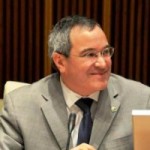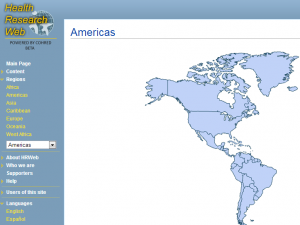Dr Luis Gabriel Cuervo, on HRWeb Americas
 Dr Luis Gabriel Cuervo is a Colombian and British father of two daughters. He is a family physician and medical doctor, a researcher and a clinical epidemiologist. He currently works as Senior Advisor for Research Promotion & Development at the Pan American Health Organization/World Health Organization (PAHO/WHO).
Dr Luis Gabriel Cuervo is a Colombian and British father of two daughters. He is a family physician and medical doctor, a researcher and a clinical epidemiologist. He currently works as Senior Advisor for Research Promotion & Development at the Pan American Health Organization/World Health Organization (PAHO/WHO).
During the past 8 years, his work has focused on championing and promoting policies for research for health, with a great emphasis on improving the governance of research, so that research can be accounted for, promoted and used in ways that are helpful to public health, and to facilitate knowledge translation so that research findings result in better health and human development. He speaks to us about HRWeb Americas, a result of the fruitful cooperation between PAHO and COHRED.
 HRWeb Americas, a collaborative project
HRWeb Americas, a collaborative project
The HRWeb Americas project addressed a need of knowledge sharing about the resources and frameworks of the national health research systems in the region. Indeed, if you don’t know what you have, you waist your resources, duplicate your work or don’t address the key, strategic elements that have to be addressed.
PAHO is both a user of HRWeb Americas, and one of its main contributors. As consumers, it helped us to give visibility to the capacities, the policies, and the contextual information on the national health research systems in the Americas. It has also allowed us to promote collaborations and exchanges, to reduce duplication and to build on synergies. The analysis of the information collected has resulted in actionable knowledge shedding light on what is needed to strengthen national health research systems. As contributors to the project, PAHO has partnered with COHRED and key stakeholders in the countries such as representatives from science and technology institutions and the health authorities to improve the data gathering and analysis. It has promoted the engagement and appropriation by different stakeholders such as consumers – the people working on research for health in the countries who use and feed this site that was built as a wiki platform. These consumers can contribute adding, updating and using this information to frame their work within existing policies, research agendas and other mandates; they use the site that is their product as well. We are all working together, we are all contributing to this, and that is I think one of the key achievements of HRWeb Americas.
Most significant changes
What I find especially significant is that this project is empowering the countries by allowing them to showcase their capacities and their outputs in research for health, it has enabled them to find the aspects that need to be developed, and they can make better informed decisions about the needs of their national health research system.
Indeed, all the information collected is now visible and easily accessible in one site, and therefore it can be more useful for example, to build partnerships. We have used HRWeb Americas to address specific questions raised to us. When a good country profile is available, we can just direct people to the link, it is that easy! The questions might be diverse, such as: who is doing research on a specific topic? Whom can I work with? What are the key institutions in a country? Which ethics review committee can I contact in this country? When we were enquiring ourselves few years ago about capacities in a country, we were frequently hearing assertions that there was little, but we would not know what that meant. Now that we are shedding light on what is available in the countries one of the big surprises of the project has been finding that there is much more than most of us usually are aware of.
PAHO helped to build a database identifying around 1200 ethic review committees in Latin America and the Caribbean, which is unprecedented; that information was not available before. This mapping allows PAHO and others to develop strategic approaches towards enhancing the standards in research ethics and research methods and therefore enables a more strategic approach to capacity development in the region. We know that ethical reviews need to have high standards and by having a better denominator of the ethics review committees we can assess the situation and work with these committees seeking to meet adequate standards throughout the region. We now know where these committees are and how to contact them to support them and see how to better address their needs.
I have received very positive feedback from beneficiaries and consumers on how it has been terrifically useful for knowing what is available. I still remember very vividly a comment made by one of the participants from Central America attending a Latin American Conference on Research and Innovation for Health (another activity for which PAHO and COHRED partnered). This person pointed out that before, they knew they had a problem but they didn’t know well what their problem was, but know they know where to start because they know what is missing and what needs to be ramped up to boost their national health research system. Now countries can be more strategic dealing with what is missing in their system. They can identify the gaps and needs and prioritize accordingly.
This actionable information helps countries and stakeholders to value and better use what is available. Hence we are working with COHRED to make sure that this information is visible, used and kept current. We are promoting that research consumers and sponsors use the site. It is very common for people to assume “we are a poor country, we have nothing”. As we have found, quite frequently they actually do have a structure, the competencies and enthusiastic champions locally. They may have a lot and they just need to shed light on what they have, organise it and get the different parts to talk to each other, and together seek opportunities to make the most of the talent and capacities they have. You cannot do that if you are not aware of what you have.
With HRWeb Americas we have a continuous improvement process. This is how, for example, we have adapted as social media evolved. Now we are enabling users to embed national HRWeb sites into other webpages for better integration and use. So there has been a permanent transformation as the needs change. I think this continuous improvement process and adaptation to the changing environment has been a terrific strength.
Another lesson is that working together, we can go further; it might take more time to do things in partnership but it is worth it as a joint enterprise can frequently lead to a substantive and optimized impact. Working together has added meaning to the appropriation, to synergies and collaboration, to avoiding duplication, and above all, I would say it has helped us to overcome resistance and implement a different way of doing things. Indeed, in partnerships you frequently face some resistance: it is normal for people to be cautious and to question what their returns will be and if these are worthy and beneficial. A change for example has been using the wiki approach to gather information and organise it in a way that would actually respond to what the definitions of national health research systems are. The partnership certainly facilitated this. It reassures people to see credible organizations joining efforts and this was possible because we were lucky to have persistent competent champions with a mind set for collaborative work. We found in Francisco Becerra a lot of the credit for building the trust leading to an effective partnership; trust and good communication were essential to get us where we are. Partnerships are not the organisational signed agreements –what brings them to life are the committed champions; you need to work with champions. It is because of the local enthusiastic and competent people in the countries that we got the information we have now and that our partnership with COHRED succeeded. They brought the commitment and passion that made things happen; they overcame the challenges moving ahead and delivering.
This collaboration is very significant as it enabled countries to get the best out of research for health. It enables them to position themselves to get the best out of research for health, to meet international standards, to address the needs of their consumers and their producers of research. Research is a tool. We need to make sure that it is effective, hence we need to know that it has an impact on people’s health, on strengthening the health system, on achieving health with equity and promoting universal health care. Research for health can also be a driver of social and economic development. The partnership has helped also with benchmarking and learn useful lessons to enhance the work with other WHO regions, and to integrate this development with other initiatives.
I have been following, accompanying, or participating in various developments in which COHRED has been very active since its inception 20 years ago and I can say with good knowledge of cause that COHRED has been at the very forefront of moving forward key topics such as making visible the fact that research for health can contribute to development and to improving health systems.
COHRED has been a key actor even in coining the concept of research for health that brings on board all research that contributes to health, regardless of whether this is produced within the health system itself. Many developments that improve health came from interactions with other sectors of society or government. When we think about the key determinants of health we realize the need to have a broader approach, one that goes frequently beyond the health sector. When you consider conditions such as chronic diseases or factors such as obesity, you quickly realize that to be effective you have to address the environment, you have to look into the transportation sector, the economics…what drives decisions and human behavior.
COHRED has also been very active bringing forward the topic of innovation. I think it has been a very influential actor and leader in the process. It has had the capacity to convene the other actors and it has been a terrific partner. COHRED has helped to build capacities, addressing the key issues, promoting strategic approaches, it has provided helpful guidance and data for processes, it has allowed our partners to deliver what they can do best, having shared tasks. For example in the Americas we have divided some tasks between COHRED, PAHO and other partners. PAHO and COHRED have used their convening power to more effectively bring different partners on board, such as health and science & technology authorities, those providing political support or technical strength. We can each target and influence actors in a way that we can be more efficient, and I think that working in partnership with such a strategic approach allows us to be more than the simple sum of the parts.
Besides its unique advocacy role and excellency for working in partnerships, thanks to its expertise on things like priority setting, evaluation, looking at financial flows, and now with its merger with the Global Forum on Health Research, I would say that COHRED has been tremendously important over the past 20 years in providing technical support and coordination, and in influencing the research for health and development agenda.
 This text is the result of an interview conducted on September 2013.
This text is the result of an interview conducted on September 2013.
Related links:
- http://www.cohred.org/2012/10/hrweb-americas-a-tool-to-facilitate-better-research-governance-in-latin-america-and-the-caribbean/
- http://www.cohred.org/2012/11/managing-information-about-research-for-health-the-case-of-health-research-web-hrweb/



